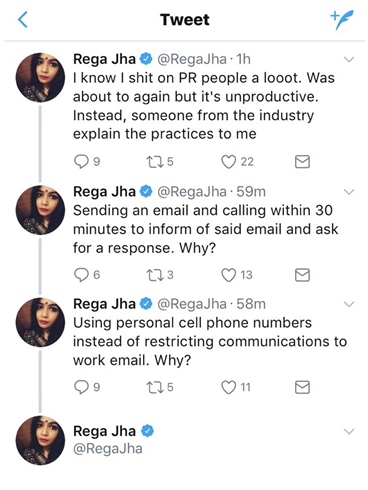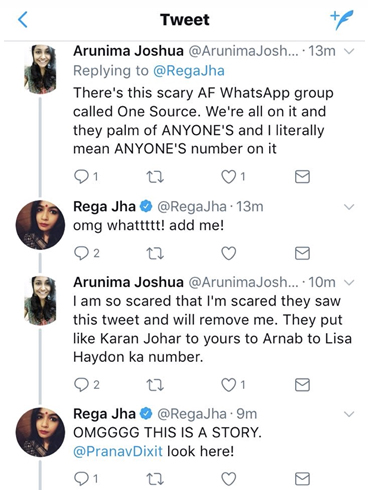Is too much communication killing the journalist-PR professional relationship?
PR Insight
Paarul Chand
When I messaged a list of questions for a story for the first time via WhatsApp and received the answers the same way, I knew I had gone over to the dark side! There is no denying the instant communication appeal of messaging apps. I have accommodated this tool in my old school journalism values.
Yet, many journalists are not too happy with their contact information, especially personal contacts, being openly shared on WhatsApp forums. This discomfort is the latest issue in the always rocky relationship between journos and PR pros.
Buzzfeed India, editor-in-chief, Rega Jha, recently called out PR professionals for the way in which journalists are approached:

This tweet promptly elicited a response that blames WhatsApp group for sharing personal contacts:

Richa Seth, account director, Adfactors PR, and member of WhatsApp forum ‘Indian PR Forum’ points out that, “Journalist contacts can be sourced from beyond WhatsApp forums, they are shared on a one-to-one basis as well. Having said that, PR practitioners can be cautious of calling journalists at odd hours or continuous follow ups for a press release.”
Ruchika, who does not want to be identified beyond her first name for this story says that WhatsApp PR forum, “OneSource has shaken down a taboo of the PR world, and with the good comes some hiccups. Sure there are some hiccups in the form of unwanted calls and leads, but the problem here is, the said PR professional not doing their homework — where does the person work, what's his or her name, is he or her even the right person to call, or is it the right time; that requires training. Easing the process is a tool for efficiency but you're not going to close anything without individual training. I have used One Source and despite me not being a PR person, it has been immensely useful to me to get the right people to talk to and to get the right information. “
Caution, approach with care : Journalist ahead!
Rega Jha, editor-in-chief, BuzzFeed India says the solution to getting in touch with journalists is quite simple, “Getting pitched stories on my professional email ID works totally fine. PR folks should understand, though, that as writers and editors we receive upwards of 100-200 such emails per day, so we aren't likely to respond to each one. However, when a story does make sense for our portal, we reply right away.”
Jha points out that, “ The massive influx of mails, of course, is a result of PR folks not tailoring their mail blasts to specific publications. I get pitches about gardening tools, banking innovations, and so many other topics that BuzzFeed India has *never* indicated any interest in.”
This is something PR professionals say they believe in.
Charu Raizada, director-corporate, PR Pundit says, “The old rule of an inverted pyramid still holds good. Journalists are not interested in commentary which is more like hmm… clearing your throat. And more importantly, if we keep bombarding irrelevant journalists with our news releases, we will never be taken seriously.”
Lovina Gujral, general manager, Candour Communications, agrees that in addition to irrelevant releases, “Immediate follow ups sometimes displease the journalists. It is always better to give them an hour or two to read through the release and then follow up to gauge their interest levels.”
Ganesh Somwanshi, founder, Krescendo Communications confesses that, “Owing to work pressure and timely deliverables, every PR wants to speak to the journalist and quickly get things done. The right approach would be to write an email to the journalist and then call the board-line number. In case even that doesn’t work calling on a phone is fine. Today, there are few journalist whom we interact with and pitch for stories on WhatsApp, share press release, pictures and documents and I feel there is no need to even make a call if one has a good story to pitch.”
Too many PR professionals, too little time!
However journalists are not too happy about being contacted via all modes of social media and regard a messaging ping as unprofessional. In practise , the pitching process is, therefore, far from perfect.
There is a problem of plenty happening as well. Says Deepak Kapoor, image manager, Perfect Relations and founder of ‘The Commune’, a forum for Ad, PR, media and marketing professionals, “ Over the last decade, the number of PR agencies and professionals has increased exponentially. This means, on an average, a journalist receives more than 100 calls and endless emails daily. Making the time window for us miniscule. Without prioritising, we also end up calling journalists for the smallest of things that may not warrant the need to do so.”
Jha points to another issue that she called out PR folks for on Twitter, sharing of personal numbers. Says Jha, “ I'm 100% ok with my professional email address being shared anywhere and everywhere, being on media databases, being circulated on WhatsApp or anything else. I am deeply uncomfortable with my personal phone number being shared anywhere, by anyone, without my consent. It is a violation of personal space and should be seen as such. “
Rakesh Kumar Jha, senior PR professional agrees with this, “Even in our personal lives, we are choosy about sharing things and talks with say mom, dad, siblings and friends. In our professional lives, we should be equally choosy and certain about how trustworthy the person is. Will s/he handle the information responsibly, with care? It is equally our responsibility to guide and guard the person with the sensitivities involved with the information — be it as basic as a contact number.”
Harday Gupta, Image Consultant, Fuzion PR Pvt. Ltd., admits that, “ Today, WhatsApp groups are playing major roles in sharing the contacts of journalist. A lot of times it happens that while doing a fresh pitching journalist ask that from where you got my number and very innocently PR professional says from a WhatsApp group. This irritates them a lot.”
Rajiv Ranjay Sarkar, senior PR professional says, “Ours is a collaborative industry and a lot of our work depends on connecting with the right person. Having said this, we need to respect that these are their personal numbers and not everybody is comfortable with having their numbers known to all. This puts journalists in a tight situation sometimes.”
Sandeep Rao, co-founder of WhatsApp PR group, One Source admits that, “ Journalists have a problem with irrelevant, unresearched calls they get. There's a one-step solution. Training. Not classroom training. On-the-job, walk-your-media-rounds, get-research-right training. To quote a friend who was also asked for her opinion for this story, "Don't call journalists at 11:30 pm at night, 8:00 am on a Sunday or when you are in knowledge of the fact that we are unavailable due to professional or personal reasons”.
One Source does offer input on how not to annoy the journalists whose contacts are being shared with, but this can be ignored by the PR pro in a hurry.
We are living in the social media age where instant communication is the norm. But perhaps it is time to go back to the drawing board and rely on good old-fashioned professional manners instead.
Disclosure : This writer is a regular member and user of One Source and other WhatsApp PR forums,
If you enjoyed this article, you can subscribe for free to our weekly event and subscriber alerts.
Featured

PR professionals share their views on journalists publicly calling them out on story pitches

Auto blogger renders unconditional apology to Value 360 for defamatory posts

Hottest Indian startups of 2020, Paytm, Dreams 11 lead the charge: Wizikey Report




